Cat DNA tests can be a helpful diagnostic tool for vets, breeders and owners, but the industry isn’t regulated, so it’s tough to verify accuracy claims. The more breeds in the company’s database, the more accurate the results.
What We Found Out About Our Cats’ DNA and Health
Keep in mind that the DNA tests we purchased look only at genes associated with cat breed, some physical traits, and elevated risk of some relatively rare health conditions. (You can buy a more expensive test from Basepaws that does more extensive genome sequencing.)
That said, we found our cats’ results to be interesting. Additionally, there were undoubtedly some variations in the ways the two businesses displayed the data about our cats.
Let’s start by looking at Tinkerbell’s results. Was this woman a Japanese Bobtail, with her bobtail and diluted calico markings?
Answer from both Basepaws and Wisdom Panel: Unlikely.
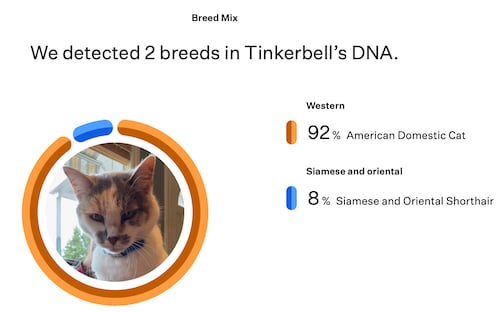

Although Tinkerbell is not a Japanese Bobtail, her geographic ancestry is Asian, which suggests that some of her ancestors may have been (also called Eastern or Siamese/Oriental)
Basepaws refrained from commenting on Tinkerbell’s bobtail, but the Wisdom Panel did
Her adorable short tail is a genetic trait, as confirmed by the Wisdom Panel traits data. But a closer look at the data reveals that her short tail genes are more frequently linked to Manx cats than Japanese Bobtail cats. OK, Tinkerbell: You’re from the Manx family.
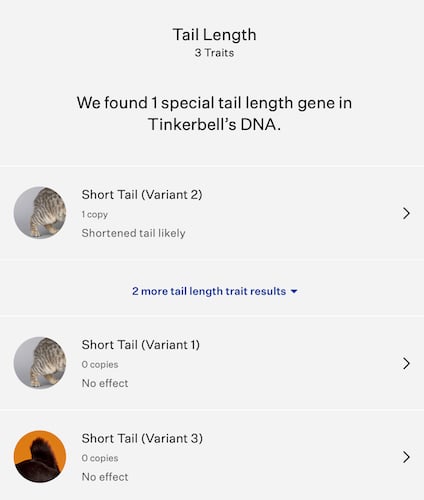
Even though Wisdom Panel provided us with additional data, we thought Basepaws’ display of the breed analysis data was excellent. You can choose the degree of certainty you wish to see, from “maybe” and “possible” to “likely” and “confident” (the variations in Tinkerbell’s results can be seen in our screenshot above).
Let’s take a look at Toby’s results. Is our very amiable friend who has large gold eyes and a short black coat related to Bombays?
Answer from Basepaws and Wisdom Panel: Unlikely.

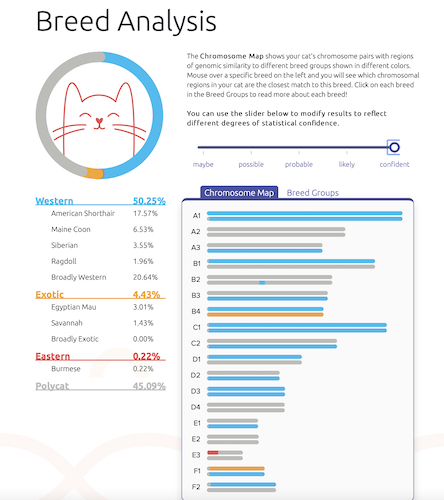
Yes, Toby is your basic Western cat (according to Wisdom Panel) or your basic Western and “polycat” (according to Basepaws). But—wait a minute! What on earth is a “LaPerm?” Wisdom Panel’s Breed Explorer Feature let us find out about this fascinating breed of small, people-oriented, curly-haired cats that originated in Oregon in 1982. While Toby is not a LaPerm, he does share some ancestors with them.
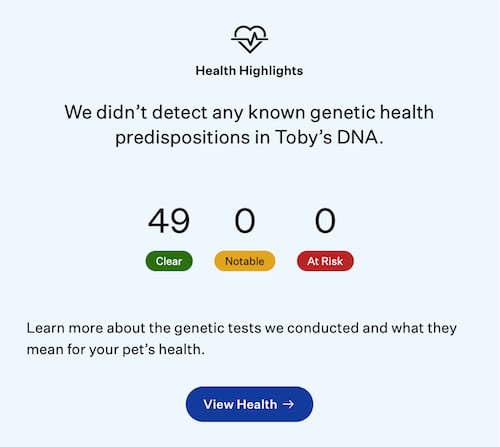
Our cats’ DNA was examined by Wisdom Panel and Basepaws to determine whether they are genetically predisposed to a higher risk of any particular health conditions for which they have comparative data. The answer, for both cats, was no elevated risks. Thus, I am unable to comment much on that aspect of the DNA test.
Interpreting Cat DNA Test Results
Although a cat DNA test won’t reveal much about your cat’s breed, it will reveal a great deal about its ancestry.
Modern domestic cats originated from Egyptian cats (similar to today’s Egyptian Mau) and spread throughout Europe, Asia, Africa, and the Americas. Genetic markers have shown that cats are differentiated into distinct groups in these four regions: the Mediterranean basin, Europe/America, Asia, and Africa. Cat DNA test results will tell you which of these groups your cat is descended from.
Certain cat DNA tests yield information about whether your cat carries a “marker” for a particular health risk. Of this, Bess is skeptical. If a test indicates that your cat has a marker for a specific disease, she advises not to panic. It does not imply that your cat currently has the illness or that it will develop one.
Researchers writing in the journal Nature point out that “most of these [pet DNA] tests are based on small, underpowered studies. Neither their accuracy nor their ability to predict health outcomes has been validated. Most vets don’t know enough about the limitations of the studies, or about genetics in general, to be able to advise worried owners.”
Therefore, even though you’re going to get more genetic information about your cat than you already have, it’s not likely to be definitive.
The Right Cat DNA Test for You Depends on Your Needs
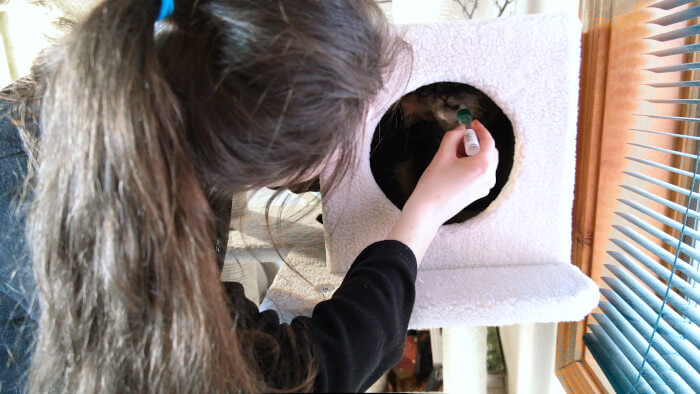
I felt that Wisdom Panel provided the best overall user experience, with very readable results and a somewhat more satisfying traits report, even though I left the experience no more certain about Wessie’s genetic heritage than before.
However, Basepaws might be a better long-term investment for people looking to learn more about the feline genome. Owned by Zoetis, the largest animal healthcare company globally, it is extensively engaged in various aspects of feline genetics research.
Although it currently seems a little bloated and unsubstantial, Basepaws’ breed report might eventually prove to be the more thorough one. Remember that as Basepaws expands, your report will continually update. I would suggest Basepaws as a long-term investment and for people who wish to learn more about their cat’s dental health.
Regarding Orivet, professionals such as breeders would benefit most from taking this test. The report is conservative and straightforward, providing only characteristics and health markers without any speculative breed information. Although it’s not a particularly enjoyable test, of the three examined here, it also appears to be the most reliable and logical.
FAQ
Which cat DNA test is better?
What does cat DNA tell you?
Is there a test to determine cat breed?
How much does it cost to test your cat’s DNA?
|
Genetic Markers + Parentage Verification
|
$44 per animal (NOT a breed test)
|
|
Coat color panel (includes 5 color tests)
|
$57
|
|
Bengal Coat Color Panel (includes 6 color tests)
|
$57
|
|
Bengal Coat Color + White Gloves (Birmans) Panel (includes 7 color tests)
|
$57
|
|
Cat Coat Color + White Gloves (Birmans) Panel (includes 7 color tests)
|
$57
|